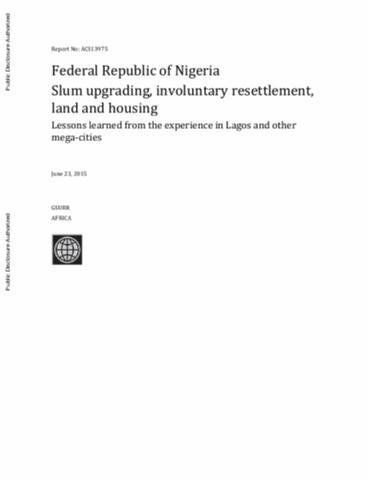The World Bank is a vital source of financial and technical assistance to developing countries around the world. We are not a bank in the ordinary sense but a unique partnership to reduce poverty and support development. The World Bank Group has two ambitious goals: End extreme poverty within a generation and boost shared prosperity.
- To end extreme poverty, the Bank's goal is to decrease the percentage of people living on less than $1.25 a day to no more than 3% by 2030.
- To promote shared prosperity, the goal is to promote income growth of the bottom 40% of the population in each country.
The World Bank Group comprises five institutions managed by their member countries.
The World Bank Group and Land: Working to protect the rights of existing land users and to help secure benefits for smallholder farmers
The World Bank (IBRD and IDA) interacts primarily with governments to increase agricultural productivity, strengthen land tenure policies and improve land governance. More than 90% of the World Bank’s agriculture portfolio focuses on the productivity and access to markets by small holder farmers. Ten percent of our projects focus on the governance of land tenure.
Similarly, investments by the International Finance Corporation (IFC), the World Bank Group’s private sector arm, including those in larger scale enterprises, overwhelmingly support smallholder farmers through improved access to finance, inputs and markets, and as direct suppliers. IFC invests in environmentally and socially sustainable private enterprises in all parts of the value chain (inputs such as irrigation and fertilizers, primary production, processing, transport and storage, traders, and risk management facilities including weather/crop insurance, warehouse financing, etc
For more information, visit the World Bank Group and land and food security (https://www.worldbank.org/en/topic/agriculture/brief/land-and-food-security1
Resources
Displaying 911 - 915 of 4906The Local Economic Impacts of Resource Abundance
What are the socioeconomic impacts of
resource abundance? Are these effects different at the
national and local levels? How could resource booms benefit
(or harm) local communities? This paper reviews a vast
literature examining these questions, with an emphasis on
empirical works. First, the evidence and theoretical
arguments behind the so-called resource curse, and other
impacts at the country level, are reviewed. This
Infrastructure in Conflict-Prone and Fragile Environments
In conflict-prone situations, access to
markets is necessary to restore economic growth and generate
the preconditions for peace and reconstruction. Hence, the
rehabilitation of damaged transport infrastructure has
emerged as an overarching investment priority among donors
and governments. This paper brings together two distinct
strands of literature on the effects of conflict on welfare
and on the economic impact of transport infrastructure. The
Investigating the Gender Gap in Agricultural Productivity
Women comprise 50 percent of the
agricultural labor force in Sub-Saharan Africa, but manage
plots that are reportedly on average 20 to 30 percent less
productive. As a source of income inequality and aggregate
productivity loss, the country-specific magnitude and
drivers of this gender gap are of great interest. Using
national data from the Uganda National Panel Survey for
2009/10 and 2010/11, the gap before controlling for
Trade in Zimbabwe
In Zimbabwe trade has been a driver of economic growth, rising incomes, and progressive empowerment of Zimbabweans through rising standards of living and the promise of better jobs. Since 1980, through good years and bad years, increases in exports have been positively associated with increases in national income. Zimbabwe's location and resource base, together with a low-cost but relatively well educated labor force, have endowed it with a naturally high trade ratio built on a diversified base that facilitates using trade as an engine of growth.
Federal Republic of Nigeria Slum Upgrading, Involuntary Resettlement, Land and Housing
This report aims to extract lessons on slum upgrading and involuntary resettlement policies and practices learned from the process of addressing the Badia East case, which involved complex interactions between affected people, NGOs, the Bank and Lagos State Government.







